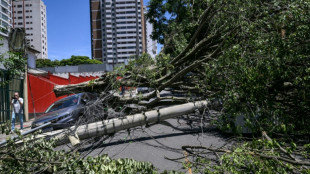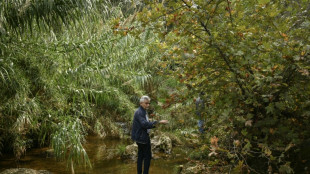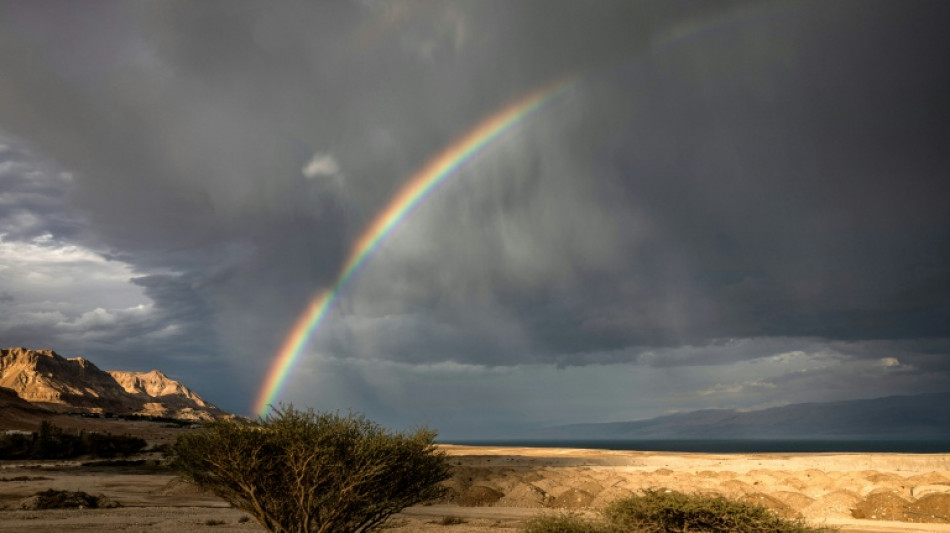
-
 Liverpool's Slot says 'no issue to resolve' with Salah after outburst
Liverpool's Slot says 'no issue to resolve' with Salah after outburst
-
'Stop the slaughter': French farmers block roads over cow disease cull

-
 Stormers see off La Rochelle, Sale stun Clermont in Champions Cup
Stormers see off La Rochelle, Sale stun Clermont in Champions Cup
-
Maresca hails Palmer as Chelsea return to winning ways against Everton

-
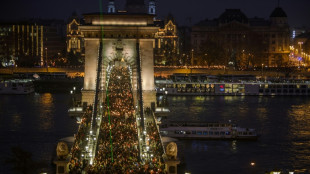 Hungarian protesters demand Orban quits over abuse cases
Hungarian protesters demand Orban quits over abuse cases
-
Belarus frees protest leader Kolesnikova, Nobel winner Bialiatski

-
 Salah sets up goal on return to Liverpool action
Salah sets up goal on return to Liverpool action
-
Palmer strikes as Chelsea return to winning ways against Everton

-
 Pogacar targets Tour de France Paris-Roubaix and Milan-San Remo in 2026
Pogacar targets Tour de France Paris-Roubaix and Milan-San Remo in 2026
-
Salah back in action for Liverpool after outburst

-
 Atletico recover Liga momentum with battling win over Valencia
Atletico recover Liga momentum with battling win over Valencia
-
Meillard leads 'perfect' Swiss sweep in Val d'Isere giant slalom

-
 Salah on Liverpool bench for Brighton match
Salah on Liverpool bench for Brighton match
-
Meillard leads Swiss sweep in Val d'Isere giant slalom

-
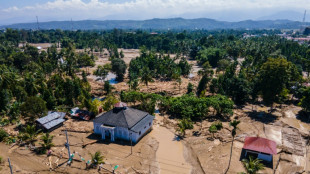 Indonesia flood death toll passes 1,000 as authorities ramp up aid
Indonesia flood death toll passes 1,000 as authorities ramp up aid
-
Cambodia shuts Thailand border crossings over deadly fighting

-
 First urban cable car unveiled outside Paris
First urban cable car unveiled outside Paris
-
Vonn second behind Aicher in World Cup downhill at St Moritz

-
 Aicher pips Vonn to downhill win at St Moritz
Aicher pips Vonn to downhill win at St Moritz
-
Thailand says 4 soldiers killed in Cambodia conflict, denies Trump truce claim

-
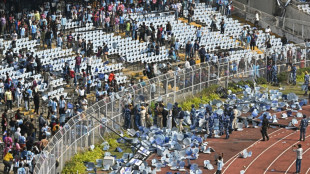 Fans vandalise India stadium after Messi's abrupt exit
Fans vandalise India stadium after Messi's abrupt exit
-
Women sommeliers are cracking male-dominated wine world open

-
 Exhibition of Franco-Chinese print master Zao Wou-Ki opens in Hong Kong
Exhibition of Franco-Chinese print master Zao Wou-Ki opens in Hong Kong
-
Myanmar junta denies killing civilians in hospital strike
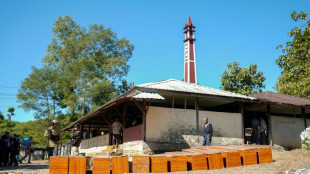
-
 Why SpaceX IPO plan is generating so much buzz
Why SpaceX IPO plan is generating so much buzz
-
Thailand continues Cambodia strikes despite Trump truce calls

-
 US envoy to meet Zelensky, Europe leaders in Berlin this weekend
US envoy to meet Zelensky, Europe leaders in Berlin this weekend
-
North Korea acknowledges its troops cleared mines for Russia
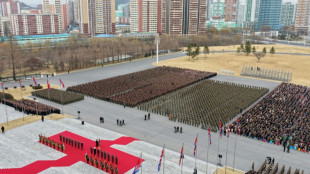
-
 US unseals warrant for tanker seized off Venezuelan coast
US unseals warrant for tanker seized off Venezuelan coast
-
Cambodia says Thailand still bombing hours after Trump truce call

-
 Machado urges pressure so Maduro understands 'he has to go'
Machado urges pressure so Maduro understands 'he has to go'
-
Leinster stutter before beating Leicester in Champions Cup

-
 World stocks mostly slide, consolidating Fed-fuelled gains
World stocks mostly slide, consolidating Fed-fuelled gains
-
Crypto firm Tether bids for Juventus, is quickly rebuffed
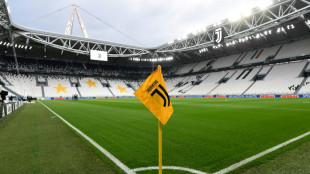
-
 Union sink second-placed Leipzig to climb in Bundesliga
Union sink second-placed Leipzig to climb in Bundesliga
-
US Treasury lifts sanctions on Brazil Supreme Court justice

-
 UK king shares 'good news' that cancer treatment will be reduced in 2026
UK king shares 'good news' that cancer treatment will be reduced in 2026
-
Wembanyama expected to return for Spurs in NBA Cup clash with Thunder

-
 Five takeaways from Luigi Mangione evidence hearings
Five takeaways from Luigi Mangione evidence hearings
-
UK's king shares 'good news' that cancer treatment will be reduced in 2026

-
 Steelers' Watt undergoes surgery to repair collapsed lung
Steelers' Watt undergoes surgery to repair collapsed lung
-
Iran detains Nobel-prize winner in 'brutal' arrest

-
 NBA Cup goes from 'outside the box' idea to smash hit
NBA Cup goes from 'outside the box' idea to smash hit
-
UK health service battles 'super flu' outbreak

-
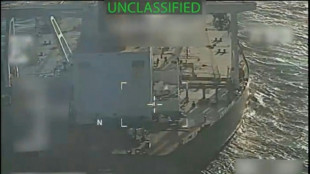 Can Venezuela survive US targeting its oil tankers?
Can Venezuela survive US targeting its oil tankers?
-
Democrats release new cache of Epstein photos

-
 Colombia's ELN guerrillas place communities in lockdown citing Trump 'intervention' threats
Colombia's ELN guerrillas place communities in lockdown citing Trump 'intervention' threats
-
'Don't use them': Tanning beds triple skin cancer risk, study finds

-
 Nancy aims to restore Celtic faith with Scottish League Cup final win
Nancy aims to restore Celtic faith with Scottish League Cup final win
-
Argentina fly-half Albornoz signs for Toulon until 2030


Dead Sea an 'ecological disaster', but no one can agree how to fix it
An abandoned lifeguard cabin, a rusty pier and mangled umbrellas are all that is left of Ein Gedi, once Israel's flagship beach drawing international tourists to float in the world-famous waters of the Dead Sea.
Now, this lush desert oasis at the lowest point on Earth sits in ruins beside the shrinking sea, whose highly salty waters are rapidly retreating due to industrial use and climate change, which is accelerating their natural evaporation.
The beach has been closed to the public for five years, mainly due to the appearance of dangerous sinkholes, but also because the dramatic recession of the sea's level has made it tricky to reach its therapeutic waters, known for extraordinary buoyancy that lets bathers float effortlessly.
The increasingly exposed shoreline and the sinkholes, caused by a flow of freshwater dissolving layers of salt beneath the Earth's surface, are not new.
In fact, the Dead Sea, nestled where Israeli, Jordanian and Palestinian territory meet, has famously been dying for years.
Now, with war raging in the Middle East, efforts to tackle this ever-worsening ecological disaster appear to have dissolved too.
"Regional cooperation is the key... to saving the Dead Sea," said Nadav Tal, a hydrologist and water officer for the Israel office of EcoPeace, a regional environmental nonprofit that has long advocated for finding a solution.
"Because we are living in a conflict area, there is an obstacle," he said, describing how the sea has been declining more than one metre (three feet) per year since the 1960s.
- 'Ecological disaster' -
The evaporation of the salty waters in a time of rapid climate change and in a place where summer temperatures can reach upward of 50 degrees Celsius (122 degrees Fahrenheit) has been exacerbated by decades of water diversions from the sea's main source -- the Jordan River -- as well as various tributaries that begin in Lebanon and Syria.
The water is also being pumped out by local factories extracting natural minerals -- potash, bromine, sodium chloride, magnesia, magnesium chloride and metal magnesium -- to sell to markets across the world.
"The consequences of this water diversion is what we see around us," Tal told AFP, pointing to a nearby pier that was once submerged in water but now stands firmly on dry land.
"It is an ecological disaster," he emphasised, adding that "the declining of the Dead Sea is a disaster for Israeli tourism".
The only remaining Israeli resorts are on the man-made evaporation ponds south of the surviving Dead Sea itself.
Recently, 22-year-old Yael and her friend Noa were looking for a place to dip their toes into the soothing waters.
Relaxing beside one of the water-filled sinkholes, Yael recalled how her parents once enjoyed going to a public beach near here.
"It was like their beach on the Dead Sea, and nowadays you pass by there and it looks like, I don't know... a shipwreck," she told AFP.
"It's hallucinatory, the destruction caused by this thing (the drying up of the sea), and it's just such a special landscape."
- Call for joint effort -
Although some efforts have been made to address the Dead Sea disaster, including past agreements signed by Israel and Jordan, the wars raging in Gaza and beyond have brought regional tensions to an all-time high, meaning tackling cross-border environmental issues is no longer a priority for governments in the region.
At Israel's environment ministry, Ohad Carny has been working on the issue for years.
He said the government was looking into several solutions, including building a desalination facility and forging a canal from either the north or the south to address the general water shortages in the region, including the Dead Sea.
"It doesn't make economic or environmental sense to desalinate water and bring it directly to the Dead Sea, because then it's a waste of drinking water and the region needs desperately more drinking water and more water for agriculture," he said.
Carny said that while his focus was on the Israeli side, "we are hoping for collaborations".
"We can't do it alone. It must be a joint effort. So only time will tell, and we won't do anything without an agreement together with the Jordanian side," he said.
"We need to understand the economic and environmental aspects of the options, and of course agree about the right solution with the Jordanians."
Back at the Dead Sea, bus driver Benny, 40, was soaking up the winter sun at one of the warm sulphur-infused sinkhole pools.
"The situation is very frustrating," he said about the sea's new topography. "But everything has a plus and minus. Because of what is happening here, we have water spots like this one."
V.Said--SF-PST

